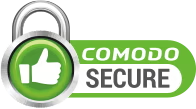SSL Certificates for your eCommerce
Protect your users’ data with an SSL certificate. Choose the level of validation according to your website’s needs.
Rapid SSL
Domain Validation
One domain
256-bit Encryption
Generated in 15 minutes
Guarantee of 10000$
Site seal
Only: 18€/year
Rapid SSL Wildcard
Domain Validation
One domain, wildcard
256-bit Encryption
Generated in 15 minutes
Guarantee of 10.000$
Site seal
Only: 145€/year
GeoTrust True Business ID EV
Extended Validation
One domain
256-bit Encryption
Generated in 1-5 days
Guarantee of 1.5M$
Dynamic site seal
Only: 259€/year
SSL certificates comparison
In the table below, we see a comparison between the paid SSL certificates and the free SSL certificate of let’s encrypt, which we include for free with each hosting account.
| Comodo | Let’s Encrypt | |
|---|---|---|
| Validation | Depends on the certificate | Domain Validation |
| Site Seal |  | |
| Protected Domains | Depends on the certificate | Single |
| Issuing time | Minutes | Minutes |
| Encryption Strength | 256-bit | 256-bit |
| Support | 24/7 Phone and chat | |
| Browser compatibility | 99.9% | 99.9% |
| Guarantee | Yes, the amount varies depending on the certificate | |
| Vulnerability Scanning | Free trial | |
| PCI Scanning | Free trial | |
| Price | From 18€/year | Free |
Which certificate to choose?
Paid SSL certificates are suitable for websites that require personal information and for websites where online payments are processed. For a simple blog, showcase website, or personal website, you simply use the free SSL certificate that we provide with all hosting plans.
When we talk about a certificate, we always use the term SSL. Actually, when we use an HTTPS connection and a certificate, we are using TLS Transport Layer Security, a more updated and reliable version of SSL.
The certificate allows the encrypted exchange of data between the browser and the server. It ensures a secure connection when a sensitive information exchange occurs, such as your users’ personal information or credit card numbers.


Analogies between the types of certificates
What do Let’s Encrypt and a paid SSL certificate have in common?
- Domain name validation
- 2048-bit RSA encryption key
- Encryption strength up to 256-bit
- Connection with HTTPS protocol
- Removal of the wording “not secure” from the browser bar
From a technical point of view, data encryption works the same way. Both certificates can be used for your website and allow you to use a secure HTTPS connection. Encryption security also does not change.
Differences between the various SSL certificates
The SSL Certificates we sell offer features that Let’s Encrypt does not offer:
- Technical support
- Guarantees
- Certificates valid for 1 and 2 years
- Certificate management tools
- Secure website seal
Comodo is a commercial certifying body that provides dedicated support. If you need help configuring the certificate, you can ask their support.


Guarantees of paid SSL certificates
Paid SSL Certificates include a guarantee. The guarantee covers any financial losses incurred by customers in case of security breaches.
These guarantees serve as a safety net, protecting you in situations where the certifying body has made an error in issuing the certificate or in their SSL protocol.
The majority of Domain Validated and Organization Validated certificates offer guarantees starting at $10,000. The guarantee varies with each certificate and can reach up to $1,750,000 with certain certificates.
